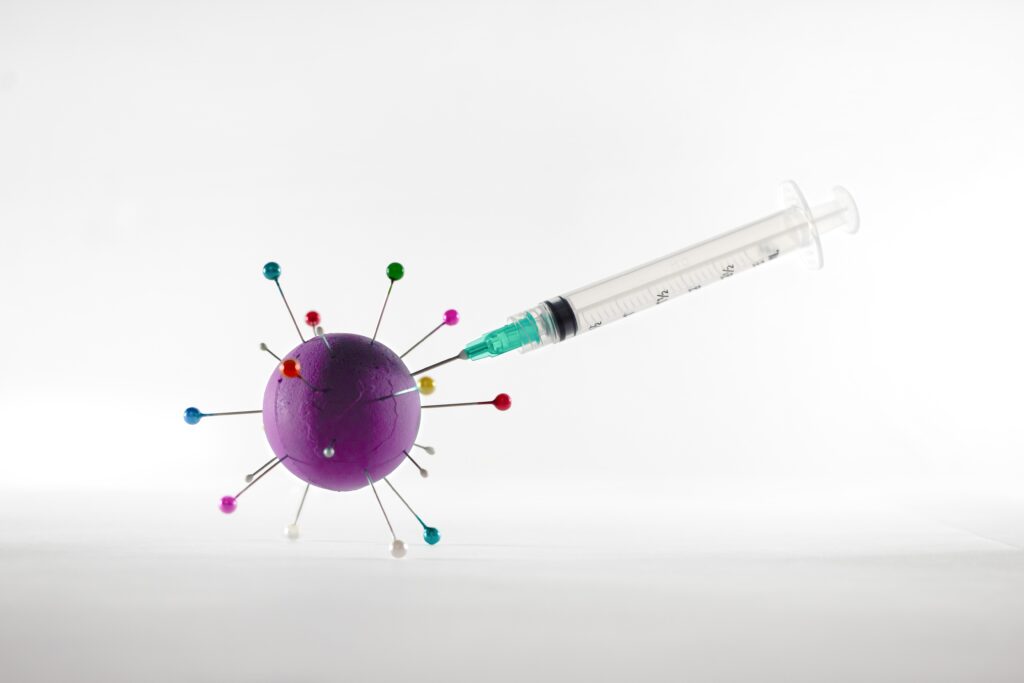Many people are excited about coronavirus vaccines. At the same time, many are a bit concerned about them. These concerns often fall into one of three categories: the speed with which the vaccine was created and approved, the risk of side effects, and the worry that the vaccine can give a person the illness.
Indeed, this vaccine was developed far faster than most vaccines; however, this was mostly due to increased funding and focus. No steps were skipped in the usual FDA testing and approval process which determined that the vaccine is both remarkably safe and 95 percent effective against the virus. (For context, the yearly Influenza vaccine is usually around 50% effective.)
But, what about the third common concern? Can you get coronavirus from the vaccine? Will it make you sick?

The Current Vaccines Do Not Use Any Live Viral Particles
There are three types of vaccines. The first is called a live virus vaccine which includes a weakened or inactivated virus that is unable to produce illness. The inactivated virus lives briefly in the recipient generating a natural immune response as if the person had been infected with the real virus. An example of this type of vaccine includes some of the Influenza vaccines.
The second type of vaccine does not contain live viruses and usually does not even contain whole pathogen particles. In other words, this type of vaccine includes (or causes the body to generate) only one or more of the proteins that make up the virus. Therefore, it is literally impossible for this type of vaccine to produce infection or illness.
The third type of vaccine involves using a separate type of virus (often adenovirus which causes the common cold) that has been weakened and altered to include proteins specific to the targeted pathogen (in this case COVID). This virus briefly lives in the recipient long enough to expose the target proteins to the immune system and generate immunity.
The vaccines currently available in the US for COVID (Moderna and Pfizer’s vaccines) are of the second type. They do not contain a live virus of any type and, therefore, it is impossible for them to cause an infection or illness.
Importantly, two other vaccines under consideration in the US (Johnson & Johnson and Astra-Zeneca’s vaccines) use adenovirus and are of the third type. As with Moderna’s and Pfizer’s vaccines, it is impossible to contract COVID from either of these vaccines as they do not contain any of the complete COVID viruses.
The Vaccine Will Not Cause You to Become Infected, But You May Have Side Effects
Remember that the goal of the vaccine is to help you develop a fervent immune response against the virus. Somewhat counterintuitively, many of the “flu-like symptoms” we experience when we are ill are actually the result of the immune system’s response to the infection. Therefore, since vaccines generate an immune response similar to having been infected, we can expect an effective vaccination to generate some symptoms or side-effects. These DO NOT indicate COVID infection, however. Some of the most common side effects you may develop following vaccination include:
- Mild fever
- Soreness and redness at the site of the injection, similar to that experienced with other vaccines
- Headache
- Muscle aches
- Fatigue
- Nausea and rarely vomiting
These symptoms are self-limiting usually lasting only a day or two. Importantly, these side-effects tend to be more pronounced after the second shot in a series or in patients who have been previously infected with COVID. Either way, your doctor can guide you in dealing with the side effects if they develop.
What About a Severe Reaction?
As with any vaccine, in rare cases, some people will have a severe reaction, usually in the form of anaphylaxis. Some of the signs of anaphylaxis include:
- Difficulty breathing
- Rapid heart rate
- Falling blood pressure
- Throat swelling/hoarseness
If you have developed a severe, anaphylactic reaction to vaccinations in the past, this is something that you will want to communicate to your doctor so that extra care can be taken when you get the vaccine!
Fortunately, anaphylaxis is readily treatable when recognized and there have not been any deaths reported from anaphylaxis in the US even though over 65 million doses have been administered to date. Also, anaphylaxis almost always develops within the first few minutes after the shot, so for this reason you may be asked to wait a bit after receiving the injection.
Rely on the Team from CapRock Health for All COVID Concerns
It is important for everyone to get the coronavirus vaccine when it is made available to them. We are here to address any questions or concerns you may have related to the vaccine. At CapRock Health, we are a freestanding emergency room in College Station, Texas. We have a tremendous amount of experience treating people with the virus. Now, we can help you with the vaccine as well. Contact us today to learn more about our services. We are here for you.

